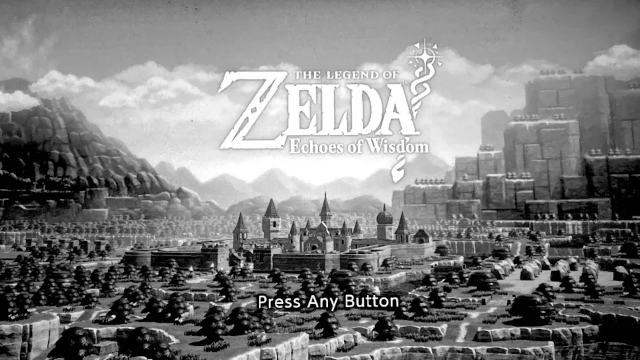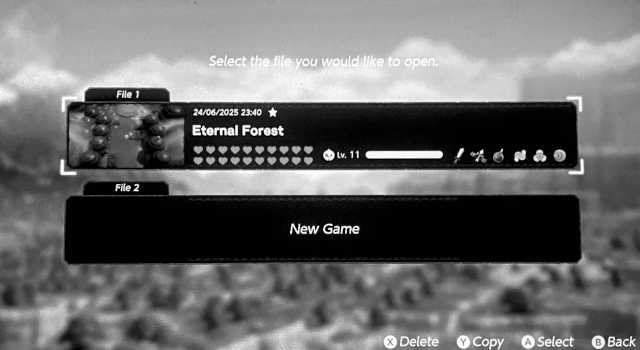Echoes of Wisdom seemingly came and went, a course of events that's absolutely baffling to me. I'm not particularly sure why either. Is it due to the lack of formally published gaming news outlets existing within the modern gaming landscape? Is it a shift from bespoke online gaming communities having directed discussion on forums, to just a hodge podge of all gaming discuourse being an imcomprehnsible sludge on social media? Does the younger generation of gamers simply not care as much about Zelda as an IP? I'm really not sure what the cause is, but that's not something I'm particularly interested in pondering too much at the given moment. The fact of the matters is that a new mainline Zelda game released.

I'm writing this about 9 months after the release of the game, I've played through it twice and really given my opinions on it time to fester. After my initial play I excitedly proclaimed that this was what I felt to be the best 2D Zelda game, but kept myself slightly in check with an understanding that my feelings may just be recency bias of having played a new game in one of my favorite franchises. Here we are in summer of 2025, and my opinions haven't changed at all. Echoes of Wisdom is the apex of modern Zelda to me, and makes me hopeful for the future of the franchise. As somebody very dissatisfied with the open-world trajectory of gaming, and feeling that Breath of the Wild and Tears of the Kingdom are some of my least favorite Zelda games, I was worried the series would just become regurgitating popular open world slop. Echoes of Wisdom however manages to embody many of the modern sensibilities of the series post-Breath of the Wild, however it merges these with classical 2D Zelda in a way that created a new framework for the series, rather than feeling like a retread of what came before.
Prior to Echoes of Wisdom, I would have told you that I thought Link Between Worlds was the best 2D Zelda game. The way it chose to design multiple solutions and routes through dungeons, to allow for nonlinear dungeon order progression created a game with a nonlinear structure, but one that still kept carefully designed challenges that required combat and puzzle solving utilizing acquired special items.
What I just described goes against the mindset of emergent gameplay that Breath of the Wild was built on. In Link Between Worlds, puzzles despite having multiple solutions, were tightly designed in a way where you had to figure out one of those options. Even though you could use multiple items to find a solution, you still had to do that puzzle solving to find one of the solutions. And you still needed to have one of the required items. Where Breath of the Wild falters is that it designs under the pretense that the player should be able to find a solution regardless of what items they have. So instead of designing tight puzzles with deliberate solutions that the player needs to engage with, Breath of the Wild gets to design a puzzle with one specific solution, but a puzzle built on such a rickety foundation that you realize the puzzle only leads to a door that was never actually locked to begin with. An easy example would be the countless shrines where rube-goldberg like machines were built to involve controlling fire to burn vines or boxes to make an object drop or reveal itself. But since the game doesn't want to force the player into any solution, the boxes/vines/platforms can be broken and revealed with any damage source at all, letting you just ignore the puzzle. Advocates of emergent gameplay in modern games seem to see this as a positive trend, but I heavily disagree with that sentiment. If the puzzles are so easy to break and bypass that you don't even engage with them, you're not giving creative players more agency, you're creating an environment where players simply need to think less about the game and don't need to work to engage with what's being presented. Breath of the Wild designs under the assumption that nothing can ever be required of the player, and nothing is ever unlocked needed to solve puzzles in later shrines. What you're doing in hour one of Breath of the Wild is exactly the same gameplay you're doing at hour one hundred.
Link Between Worlds may have been nonlinear, and puzzles had multiple solutions, but you still needed to find or unlock one of the keys to those solutions. You aren't given all of the tools at the start of the game, so there's a sense of progression instilled by letting the player unlock more complex items later in the game to design more complex puzzles for later dungeons. Echoes of Wisdom operates like Link Between Worlds in this regard, if not better. Echoes of Wisdom eschews traditional Zelda item acquisition, but replaces these functions with objects and creatures you can summon that each fulfill unique rolls in solving puzzles.
With so many echoes in the game, it would be understandable to assume puzzles would be half-baked, allowing for players to use almost any echo to bypass engaging with the puzzle. Echoes of Wisdom doesn't fall into this trap though, instead the game chooses to hold back specific echoes as essentially classic dungeon items, and designing puzzles after around these specific dungeon item-like echoes. This allows for Echoes of Wisdom to feature tightly designed puzzles around using specific echoes given to you within that dungeon/area.
Echoes of Wisdom manages to still keep a bit of the emergent gameplay feeling within basic movement options, combat and overworld navigation, so for people who do want more of a sandbox style of gameplay, that still exists here as well. Especially in regard to combat and overworld traversal, the game gives you dozens of options to accomplish tasks. With the overworld featuring a plethora of proper Breath of the Wild styled sidequests from NPCs, there's a lot of reason to hang around in the overworld if this is the type of gameplay you're looking for.
I'm honestly impressed with how Echoes of Wisdom manages to appeal to a classic Zelda fan like me, while still retaining so much of the identity of a post-Breath of the Wild franchise, and still leaving aspects of the open-world sandbox gameplay intact for fans who prefer that. A Link Between Worlds was never going to change the opinion of somebody who didn't inherently like what 2D Zelda is in its structure and gameplay loops, but Echoes of Wisdom simultaneously satisfies an old player like me while being different enough that I could see this being the singular 2D Zelda people who don't mesh with classic games in the Zelda franchise would enjoy. With that being said I find it such a shame that the sales figures for the game are so paltry relative to other recent Zelda releases. Echoes should be lauded as the best 2D entry into the franchise, a new direction that takes inspiration from the classics as well as the modern open world games. Meanwhile it just seems as if Echoes of Wisdom released to only the most hardcore Zelda fans, and fell upon deaf ears to everybody else. I only hope with the future that people will start really pushing to be vocal about how excellent this game is. Zelda wasn't necessarily a franchise that needed a revival game like Echoes of Wisdom, but for somebody like me who dreaded the idea of a post-Breath of the Wild IP, I'm eager to see what the future of the franchise has in store. I'm no longer worried about the series stagnating as something I do not enjoy, but I'm confident instead that this series will continue to evolve with the times and go in directions I never would've been able to predict.
If you haven't played Echoes of Wisdom yourself, I very highly recommend you give it a go. I am now confident in saying Echoes of Wisdom is my favorite game on the Nintendo Switch.
— Juni - June 24th, 2025 —

